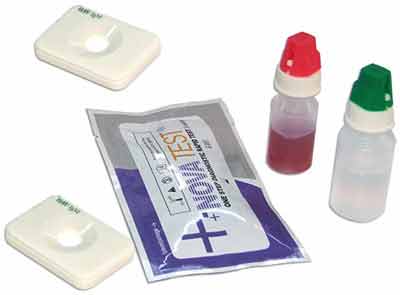anti-hCG IgG DOT Assay Kit
Anti-hCG IgG test kit is used to detect antibodies specific to human chorionic gonadotrophin in women serum specimen, as an clinical indicator in the diagnosis of infertility among women.

Intended Use
Anti-hCG IgG DOT Assay Kit is a rapid test kit, intended to qualitatively detect the IgG antibody specific to Human chorionic gonadotropin (hCG) in human serum specimen, and is used as an clinical indicator in the diagnosis of infertility among women.
anti-HCG Testing Principle
In this Anti-HCG IgG rapid test, nitrocellulose membrane is pre-coated with purified hCG. During the assay, the anti-HCG IgG antibody, if present in the specimen, will be captured by the hCG. In the subsequent procedure, the reagent of anti-human monoclonal IgG antibody (anti-human) conjugated with colloidal gold is added. The secondary antibody will be captured by the bound anti-hCG, and a pink color will develop, indicating a positive result.
How anti-HCG affects pregnancy
Human chorionic gonadotropin (hCG) plays an essential role in the implantation of the blastocyst, which help the fetus to cancel rejection by suppressing the immune system. But when anti-HCG concentration is high, these antibodies will affect the function of hCG, thus reduce the chance of pregnancy. This effect of embryo Interception of implantation by anti-hCG antibodies is proved by various studies.
anti-HCG and Infertility
Studies shows sexually active women rarely become pregnant, in whose blood the anti-hCG antibody concentration usually remains above 50 ng/mL. Also, studies show the levels of estradiol (E2) and progesterone (P) in anti-HCG positive group were significantly lower than that in anti-HCG negative group. These study results proves that combined detection of anti-HCG, estradiol and progesterone were of important clinical value in diagnosis of infertile women.

 Atlas Link Technology Co., Ltd
Atlas Link Technology Co., Ltd